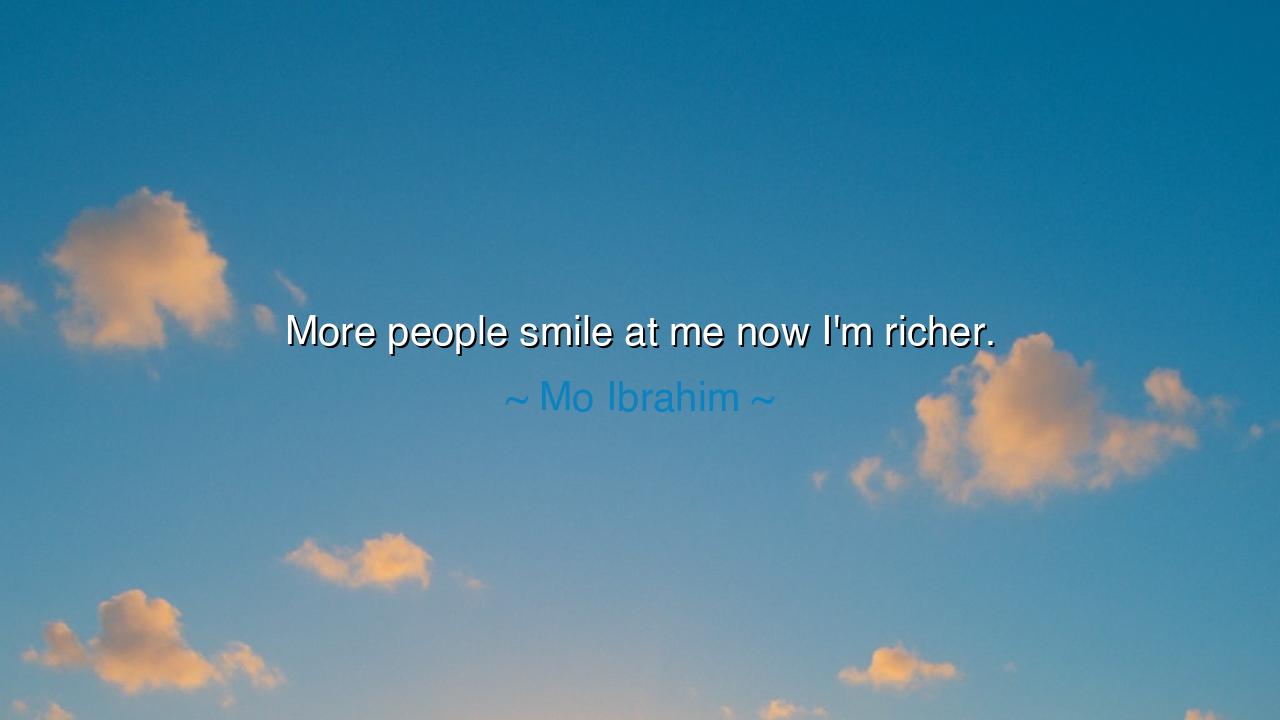
More people smile at me now I'm richer.






The words of Mo Ibrahim fall with both candor and weight: “More people smile at me now I’m richer.” In these few syllables he unveils the strange truth of human nature—that wealth does not only change the life of the one who gains it, but also changes the behavior of those who surround them. The smiles of others, once perhaps sparse or indifferent, multiply in the presence of wealth, and yet these smiles are not always born of joy, affection, or respect. Often, they are born of calculation, of envy restrained, of hope for favor. Thus his statement is not a boast, but a lament disguised in irony.
The origin of this truth lies deep in the history of humankind. From the earliest kingdoms, men and women have bent their backs and brightened their faces in the presence of riches, not for love of the person, but for love of what the person possessed. Gold has always commanded gestures of warmth, even when the heart behind them was cold. The merchant greeted with reverence not because of friendship but because of treasure. The poor man’s worth was ignored, though his soul may have burned brighter than a king’s. Mo Ibrahim’s words expose the age-old reality: prosperity does not simply attract companionship—it attracts masks.
History offers us countless mirrors of this truth. Consider the tale of Croesus, the legendary rich king of Lydia. While his treasuries overflowed, he was surrounded by admirers, courtiers, and allies who praised his wisdom and his fortune. But when Cyrus of Persia overthrew him, those same admirers vanished like smoke in the wind. Their smiles had never been for Croesus himself, but for the glitter of his wealth. The moment the gold was gone, so too were the hands that once clasped his.
Mo Ibrahim, a man who rose from humble beginnings to immense success, surely knows that the smiles he receives now are not the same as those of his youth. Some are genuine, born of admiration for his vision and his works. Yet others, he discerns, are counterfeit—smiles minted like coins, designed to purchase advantage. The wisdom in his words is that he sees through them. He recognizes that riches may widen circles but often shallow them, creating relationships that are broad in number but thin in sincerity.
This truth is echoed in the story of the Roman general Lucullus, famed for his immense wealth and feasts. While he lavished others with abundance, his tables were crowded. But when he withdrew into simplicity, seeking only a few companions for a modest meal, he discovered how few would remain without the lure of luxury. The lesson of Lucullus, like that of Ibrahim, is that prosperity tempts others to act falsely, covering their ambition with smiles that do not spring from the heart.
The deeper meaning, then, is not to scorn wealth, but to recognize its double edge. Wealth can build, heal, and serve, but it can also distort the very face of friendship. A wise soul must learn to distinguish between the smiles of genuine love and the smiles purchased by gold. Without this discernment, one may be surrounded by many and yet remain utterly alone.
Therefore, let us take action from this teaching. If you possess much, test your friendships by generosity without advantage—see who stands with you when there is no gain to be had. If you possess little, let your smiles be true, unmoved by envy or calculation, given as gifts and not as currency. For the world is full of false smiles, but true ones are treasures greater than all riches.
Thus, the words of Mo Ibrahim are not bitter, but wise. They remind us that prosperity reveals the hearts of others more clearly than poverty ever could. Many will smile when you are rich, but only a few will smile when you have nothing. Seek those few, hold them close, and you will be richer than emperors—for their loyalty, unlike gold, will never tarnish nor be stolen by time.






AAdministratorAdministrator
Welcome, honored guests. Please leave a comment, we will respond soon